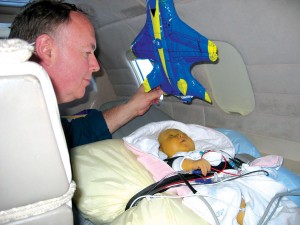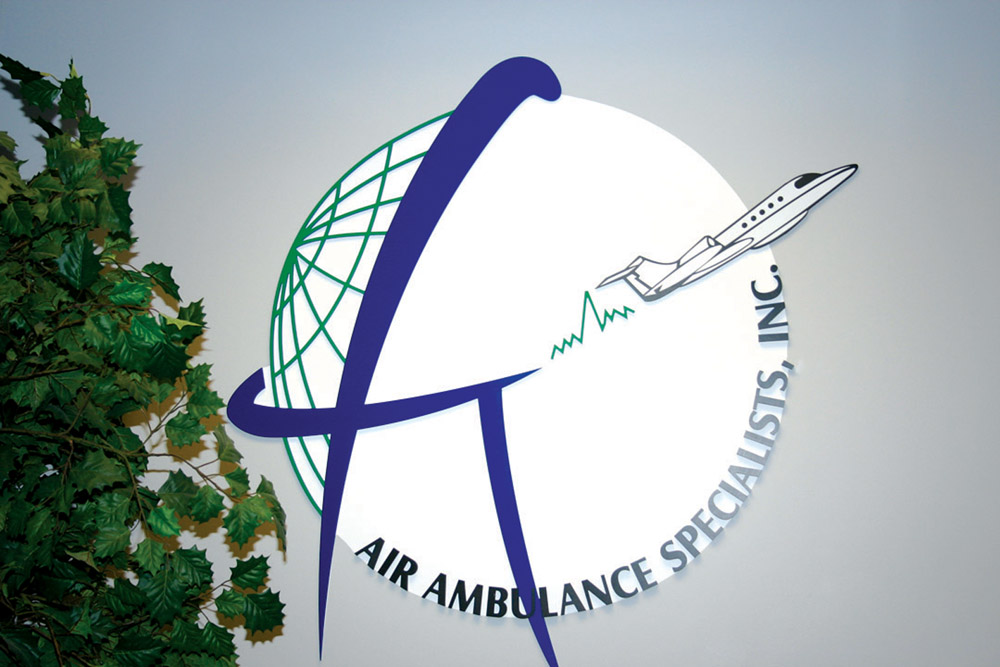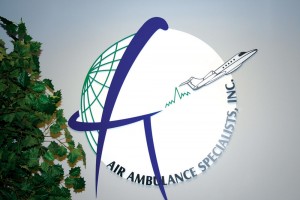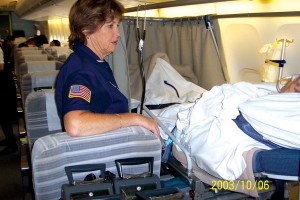By Nissa LaPoint
About four years ago, fresh into the air ambulance transport market, Air Ambulance Specialists had a slim total of eight employees. Today, the company employs about 100, while receiving a stamp-of-approval from the Commission on Accreditation of Medical Transport Systems and earning the International Air Ambulance of the Year Award.
“We’ve gone in three years from a startup company to doing 150 medical flights a month. It’s been a big growth process and a big success story,” said Don Jones, CEO and president of Air Ambulance Specialists.
This year the Air Ambulance Specialists received their accreditation from CAMTS, which involved a thorough four-day inspection to determine if the company demonstrated a specific quality of service.
“We did get our accreditation from CAMTS,” Jones said. “That’s a big accomplishment for all the members of our organization. CAMTS is for the aeromedical industry—for the top of the line. They go through nursing records, pilot records, training records, drills for crashes, procedures, protocols. They go through everything you can think of, from A to Z. We got it on our first attempt, which very few fixed-wing companies have done.”
The specialists didn’t stop there. The International Travel Insurance Journal named the company “International Air Ambulance of the Year” in November 2004.
“I was pretty proud of that,” said Jones with a smile.
Air Ambulance Specialists began their company in June 2002 in St. Petersburg, Fla., but soon after expanded to Centennial Airport, making it their home base.
“Air Ambulance Specialists was established because we believed that there was a lack of quality in air ambulance providers, particularly in the United States,” Jones said. “We wanted the case managers, hospitals, social workers, and assistant programs, both domestic and internationally, to know that when they called Air Ambulance Specialists, they were going to be able to trust and to count on us to provide the service for their patients that we advertise we can provide.”
As an air ambulance service, the company provides fixed-wing air ambulance transports, commercial stretchers and medical escorts for a wide range of customers. Those customers include individuals and families, managed care and travel assistance companies, hospitals, government agencies, insurance companies, embassies and other providers of medical care. Air Ambulance Specialists offer these services worldwide.
“Our medical crew could get a transfer from one of our small prop airplanes from Denver to Durango, or they could get Los Angeles to New York, or from Brazil back to Denver or London,” Jones said. “I think that’s why a lot of people like it, because you never know what you’re going to get.”
He said that getting to see the world is one of the perks of the job. Other facets to the services provided are an all-inclusive written quote, a highly trained and experienced flight coordinator, ground ambulance coordination for departure and arrival, full medical consultation, a full medical report to the accepting physician, strong communication, “bedside to bedside” care, and even customs, immigration and international handling for patients.
“Typical types of transports we have, diagnosis wise, include cancer and stroke patients, cardiac patients and mobile trauma patients. Normally, the patient is going from the place where they’re at to a potentially higher level of care,” said Jones.
To transport the patients, Air Ambulance Specialists most often utilize the Learjet and Cessna. Gulfstream and Challenger aircraft are available upon request, while a prop-engine aircraft is a cost-effective means for shorter flights.
“We have the most dedicated pilots,” said Don McCormick, chief flight nurse. “It’s phenomenal how dedicated everybody is to making sure that every flight goes right, that we have a quick leave, and that we get from point A to point B.”
On each aircraft is an aeromedical crew and medical equipment configured for critical care, no matter what the patient’s needs may be. Their equipment covers basic and advanced life support and critical care.

Don McCormick said he grew particularly attached to this 4-month-old baby. He said, “I became Grandpa Don.”
“The aircrafts are all equipped like mini-intensive care units,” said Janet Borrego, Air Ambulance Specialist’s director of marketing. “So there’s ventilators, infusion pumps, et cetera.”
Other life-sustaining equipment like cardiac monitors, defibrillators, IV solutions, intubations equipment, oxygen and more is also aboard the plane. The equipment is ready for extraction from the plane if needed.
“We travel to different countries like Mexico, Bolivia, and Asia, or any other third-world countries where the ambulances aren’t equipped like the U.S.,” Borrego said. “So we have to take the equipment off. We have a lot of them in bags, and equip the ambulances to care for our patients. Sometimes some of these ambulances aren’t more equipped than someone’s pick-up truck. Sometimes it is a pick-up truck.”
Attending to the patients who request the company’s service is a medical crew of registered nurses, respiratory therapists, critical care physicians and advanced life support paramedics. According to Jones, someone must have at least five years of experience just to get an interview with the company. Most staff members have 10 or even 20 years of medical experience.
The crew’s work “tour” is on a two-week-on and two-week-off basis. While on tour, the crew is sent on missions around the U.S. or internationally.
Jones said the medical crew must have qualities like flexibility and the ability to adapt. He gives an example of a trying situation.
“You land in Bogotá, Columbia, and the pick-up truck is there, and the customs guy is pointing a gun in your face,” he said. “You get to the hospital and it’s a pit, and the patient hasn’t been touched and has been on a flat slab for two days in his room. With all those issues, you have to have someone who doesn’t lose their cool, deals with the situation, makes good and accurate decisions and keeps the big mission on their mind.”
Air Ambulance Specialists are available for calls requesting their services 24 hours a day, seven days a week. Jones said there’s always somebody in the dispatch office. When their phone rings, the crew must be ready to respond and be off the ground in an hour and a half.
Jones said he enjoys his job because they deal with something different everyday.
“Whether its maintenance issues, FAA issues, pilot issues, medical demands or languages,” he said. “Also, dealing with countries, getting permits and legalities—there’s always something and it’s never dull.”
“When quality and trust count” is the motto to which the company adheres. They assure quality through their many committees, meetings and other efforts.
“We have our safety committee and quality assurance committee. Our chief flight nurse reviews every patient’s flight record and random medical staff members perform reviews. We’re very on top of everything that happens with every trip,” said Borrego.
To receive feedback, the company sends out quality assurance questionnaires to patients, their families and insurance companies asking their opinions on the medical crew’s services, communication, and even their punctuality. Among the company’s committees is the safety committee, which meets at least quarterly, if not bimonthly, said Jones. The employees will congregate to discuss any issues that arise.
“We’ll talk about maybe a land ambulance service that didn’t meet the quality of our standards or about a new medical device that’s safer or better,” said Jones. “We go to Canada in the wintertime and sometimes the temperatures are negative 30 degrees Fahrenheit. There’s potential of the drugs freezing. We had to come up with procedures and protocol because it hadn’t come up before. Then we have the quality control committee that also reviews a variety of different things. They’ll take different aspects of our operation for a month and see what the results are. Then they make corrections so we have a better program.”
The company is dedicated to keeping their crew educated. They help ensure this by an in-house website, which crewmembers can log onto anywhere in the world. Every month the website contains links and information educating and keeping them up-to-date on the latest technologies and more. Completion of a module online is a monthly requirement to maintain knowledgeable crewmembers, according to Jones.
Last, but not least, is the monthly conference call, also focused on addressing possible issues.
“We also have a monthly medical staff meeting,” said Jones. “It’s a conference call, because we have planes all over the place. We run it on a Sunday evening, which is typically our lowest time of having aircraft in the air. Everyone calls into one number; we’ll have 50 to 60 people on a conference call at one time talking about the issues at hand. We don’t have to pull all the airplanes here to have a meeting. It’s very efficient.”
Patients and their families will write letters to Air Ambulance Specialists, thanking them for their service. One such testimony came from a young girl. The letter said, “Thank you so much for saving my life. The plane ride was very long and scary going from Russia to the U.S. You made me feel safe and you also made the plane ride seem so much shorter. You saved my life and I thank you for that.”
McCormick has traveled around the world for Air Ambulance Specialists, to places like Hong Kong, Mongolia and even Siberia.
“When we get a patient, that’s all we think about,” he said. “We do everything we can to make them comfortable and safe. The nice thing is that we sit six inches away from our patients. After four to six hours, we become very close to them, mentally and emotionally. We bond so closely, so tightly with patients that we become part of their family and they become part of ours.”
Another letter addressed to the company said, “I would just like to extend my sincere thanks to you from the bottom of my heart. You could not possibly understand how thankful we are for everything your company has done for us. We’ll never forget your kindness.” Borrego said that it’s humbling everyday.
“It’s rewarding helping people in a crisis situation out of that situation,” she said.
Air Ambulance Specialists aren’t planning on expanding to other cities, but rather, expanding their fleet and the amount of monthly medical flights.
For more information, visit [http://www.airambulancespecialists.com].













